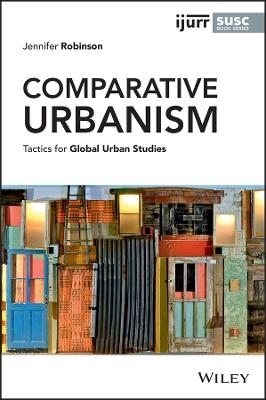
Comparative Urbanism
John Wiley & Sons Inc (Verlag)
978-1-119-69751-0 (ISBN)
Jane M. Jacobs, Professor of Urban Studies, Yale-NUS College, Singapore
‘How to think the multiplicity of urban realities at the same time, across different times and rhythmic arrangements; how to move with the emergences and stand-stills, with conceptualisations that do justice to all things gathered under the name of the urban. How to imagine comparatively amongst differences that remain different, individualised outcomes, but yet exist in-common. No book has so carefully conducted a specifically urban philosophy on these matters, capable of beginning and ending anywhere.’
AbdouMaliq Simone, Senior Research Fellow, Urban Institute, University of Sheffield
The rapid pace and changing nature of twenty-first century urbanisation as well as the diversity of global urban experiences calls for new theories and new methodologies in urban studies. In Comparative Urbanism: Tactics for Global Urban Studies, Jennifer Robinson proposes grounds for reformatting comparative urban practice and offers a wide range of tactics for researching global urban experiences. The focus is on inventing new concepts as well as revising existing approaches. Inspired by postcolonial and decolonial critiques of urban studies she advocates for an experimental comparative urbanism, open to learning from different urban experiences and to expanding conversations amongst urban scholars across the globe.
The book features a wealth of examples of comparative urban research, concerned with many dimensions of urban life. A range of theoretical and philosophical approaches ground an understanding of the radical revisability and emergent nature of concepts of the urban. Advanced students, urbanists and scholars will be prompted to compose comparisons which trace the interconnected and relational character of the urban, and to think with the variety of urban experiences and urbanisation processes across the globe, to produce the new insights the twenty-first century urban world demands.
Jennifer Robinson is Professor of Human Geography, University College London, UK. She is the author of Ordinary Cities, a seminal work which developed a postcolonial critique of urban studies. Her empirical research in South Africa examined the history of apartheid cities and the politics of post-apartheid city-visioning, while her comparative research has considered urban development politics in London, Shanghai and Johannesburg, and transnational circuits shaping African urbanisation.
Series Editors’ Preface Preface ix
Introduction 1
Part I Reformatting Comparison 23
1 Ways of Knowing the Global Urban 25
Uncertain Territories, ‘Strategic Essentialisms’: Regions, the Global South and beyond 27
The Disappearing City: Planetary Urbanisation and its Critics 35
Decolonial, Developmental, Emergent: Different Starting Points, or Incomparability? 41
Dimensions of a Comparative Urban Imagination 47
Conclusion 50
2 The Limits of Comparative Methodologies in Urban Studies 53
Some Analytical Limits to the ‘World’ of Cities: Beyond Incommensurability 54
Conventional Strategies for Comparison in Urban Studies 57
The Potential of Comparative Research 69
Conclusion 76
3 Comparative Urbanism in the Archives: Thinking with Variety, Thinking with Connections 79
Expanding the Comparative Gesture 80
Thinking with Variety 83
Stretching Comparisons: Thinking with Connections 91
Conclusion 104
4 Thinking Cities through Elsewhere: Reformatting Comparison 107
Thinking with Concrete Totalities 108
Singularities, Repeated Instances, Concepts 119
Genetic and Generative Grounds for Urban Comparisons 125
Conclusion: From Grounds to Tactics 128
Part II Genetic Comparisons 135
5 Connections 137
Connections as Urbanisation Processes 138
Connections Producing Repeated Instances 146
Every Case Matters 154
Conclusion 159
6 Relations 161
Wider Processes 164
Urban Neoliberalisation, Comparatively 171
Connected Contexts 186
More Spatialities of the Urban: Topologies, Partial Connections, Submarine Relations 191
Conclusion 195
Part III Generative Comparisons 199
7 Generating Concepts 201
The Conceptualising Subject: Institutions, Horizons, Grounds 204
A Life of Concepts: Ideal Types 217
Thinking the ‘Concrete’ 230
Negotiated Universals: Concepts ‘In-common’ 235
Conclusion 243
8 Composing Comparisons 247
Working with ‘Conjuncture’ 249
Conceptualising from Specificity 263
Thinking across Diversity 271
Conclusion 276
9 Conversations 279
Shifting Grounds: Comparison as Practice 280
Comparison as Conversations 284
Theoretical Reflections 292
Mobile Concepts, or ‘Arriving at’ Concepts 295
Conclusion 301
Part IV Thinking from the Urban as Distinctive 305
10 Territories 307
Thinking from Territories 308
Which Territorialisations? 312
Assembling Territories 320
Conclusion 325
11 Into the Territory, or, the Urban as Idea 329
Detachment 331
Suturing 336
Standstill 340
Ideas 346
Informality, as Idea 357
Conclusion 362
Conclusion: Starting Anywhere, Thinking with (Elsew)here 369
A Reformatted Urban Comparison 370
Conceptualisation 376
An Explosion of Urban Studies 383
References 387
Index 441
| Erscheinungsdatum | 17.08.2022 |
|---|---|
| Reihe/Serie | IJURR Studies in Urban and Social Change Book Series |
| Verlagsort | New York |
| Sprache | englisch |
| Maße | 152 x 229 mm |
| Gewicht | 794 g |
| Themenwelt | Naturwissenschaften ► Geowissenschaften ► Geografie / Kartografie |
| Sozialwissenschaften ► Politik / Verwaltung | |
| Sozialwissenschaften ► Soziologie ► Allgemeine Soziologie | |
| ISBN-10 | 1-119-69751-4 / 1119697514 |
| ISBN-13 | 978-1-119-69751-0 / 9781119697510 |
| Zustand | Neuware |
| Informationen gemäß Produktsicherheitsverordnung (GPSR) | |
| Haben Sie eine Frage zum Produkt? |
aus dem Bereich


